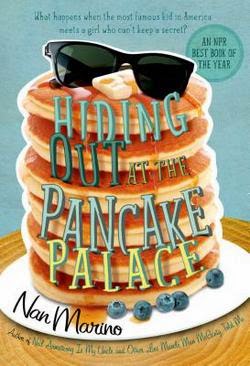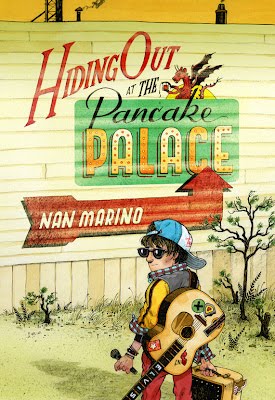This week debut author Laura Toffler-Corrie stopped by Ramble Street. Laura is the author of the very funny middle grade book The Life and Opinions of Amy Finawitz (Roaring Brook Press, 2010)
Here’s the publisher’s blurb:
“Told in wry emails and brilliant little one-act plays, this laugh-out-loud debut novel offers quirky characters, a whimsical tour around New York City, and an appealing story about what it means to be a good friend.”
And here’s what Newbery Honor Winning Author Patricia Reilly Giff says:
“Amy Finawitz pops right off the page! Her opinions and wry observations made me laugh out loud and her lively adventures are both surprising and captivating. This is certainly an author to watch. I loved Amy, and I bet you will too.”
This book is extremely funny. It has great heart (and a really fun mystery too).
Laura and I have a lot in common. We both grew up on the south shore of Long Island, our birthdays are only days apart (and we’re the same age) and our debut novels are published by Roaring Brook (which means we got to work with the same amazing editor, Nancy Mercado).
So Laura, welcome to Ramble Street. Let’s start the interview.
I don’t normally laugh out loud when I read. But I did when I read AMY FINAWITZ. So let’s get to the question I’m wondering most about. How do you write such great comedy? Any tips for writers?
"Well, comedy is a funny thing (sorry, couldn’t resist). I’m not sure that you can be taught to write humorously. I think it’s a sensibility, how you naturally perceive the world. I’ve always loved what’s absurd or ironic. I do think, though, that you can learn from other writers, Dickens, J.D Salinger, Woody Allen and Vonnegut to name a few, who do it well. I guess my tip is to not try too hard and to create fully realized characters and situations, otherwise humor can seem flat or ‘jokey.’"
What was it like when you got the editorial letter? Did you enjoy the editorial process?
"At first, getting the editorial letter was exhilarating! I was so happy to have sold my book and anxious to get working with my editor, and yours, the fabulous and insightful Nancy Mercado. Then the scary part set in. How do I incorporate someone else’s vision with mine? Can I make the book better? Will Nancy be happy with my work? I quickly discovered that working with her was an inspiring interaction. Ultimately, it was exciting to see my book develop into everything I wanted it to be."
I had the same feelings and fears. By the way,“inspiring interaction” is a great way to describe working with Nancy Mercado.
I loved the places in NYC that Amy, Beryl and Miss Sophia visited. I can't believe I grew up so close to Queens and didn't know about Houdini's grave. How did you come up with such interesting places for your characters to travel to? Have you visited Houdini's grave?
"Because the first few drafts of AMY were more focused on a scavenger hunt around New York to search for clues to solve a historical mystery, I spent a lot of time thinking up cool places for Amy to go. I think I actually even googled ‘cool places in and around N.Y.’ Honestly, I can’t recall what led me to Houdini in the first place, but as I started researching his life and death and discovered the secret message to his wife from beyond the grave, I became determined to make him a small part of the story. Having a Houdini’s graveyard scene in AMY was too awesome to pass up though. Actually, my agent, editor and I did an abbreviated ‘Footsteps of Amy’tour around NY, including Houdini‘s grave. Check it out here "
The tour looks like great fun. Now I have so many new places to put on my “to visit” list.
One of my favorite parts of your book was learning about the immigrant Anna. Her story is so intriguing. I don't want to give anything away here, but did this happen in history?
"The historical mystery in the book is true. I was breezing through an article about Jews in American history and came across this three line blurb about it. I was shocked that I’d never heard the story before. So, even though, Anna is fictional, this odd piece of American history seemed like the perfect element to weave into her story."
What's the best writing advice you ever received?
"‘Success leaves clues,’ is one of the best pieces of advice I’ve ever heard just generally. When I started trying to emulate the habits and philosophies of writers who I admired, basic concepts surfaced, like write everyday, stay focused, persevere in an intelligent way."
It was just announced that you have a second book coming out. Congratulations! Can you tell us about it?
"The working title is THE ACCIDENTAL SAINTHOOD OF JENNA BLOOM, which I really like and am thinking will probably stick. It’s a humorous YA and the easiest way to describe it would be to quote Publisher’s Weekly which says, ‘a comedy of errors about an awkward teen who becomes the unlikely object of her guardian angel's affection, much to the calamity of the town musical, the dismay of all the popular girls and the demon who has it in for her.’
It was acquired by Nancy Mercado at Roaring Brook and I’m very excited to be working with her again. You could say that I’m just excited in general and looking forward to diving into the book. Right now, it’s scheduled for release in the spring of 2012."
Thanks for stopping by Ramble Street, Laura. To find out more about Laura’s book and to read her very entertaining blog, visit her at www.lauratoffler-corrie.com


























